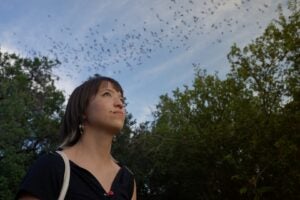AUSTIN, Texas—The University of Texas at Austin will be the site of a one-day conference on Friday (April 23) featuring noted scientists from varied disciplines such as chemistry, biology, physics and engineering who will discuss breakthroughs in scientific technologies involving “ultrafast spectroscopy and ultramicroscopy.”
These methods are on the frontiers of science and are linked to progress in a wide variety of technologies, including:
- Early cancer detection and treatment;
- Arteriosclerosis detection and treatment;
- Microelectronics for medical diagnosis;
- Flexible, lightweight and portable computer displays; and
- High-speed data processing and storage devices.
“The focus of the meeting is the development of new instruments and new techniques in microscopy and spectroscopy for the investigation of the structure and chemical properties of complex samples ranging from novel computer displays to cancer cells,” said Dr. Paul Barbara, conference organizer and director of the Laboratory for Spectroscopic Imaging (LSI) at UT Austin. “A new laboratory has been opened for such investigations and a new graduate program for training in this area has been established with funds form the National Science Foundation.”
The conference, titled Breakthroughs in Ultraspectroscopy and Ultramicroscopy, will take place from 8:30 a.m. to 5:30 p.m. in the Atrium Room (fourth floor) of the Flawn Academic Center. The conference is free and open to the public, but attendees are requested to pre-register by e-mail to p.barbara@mail.utexas.edu.
The meeting is being conducted in recognition of three events: the opening in UT Austin’s department of chemistry and biochemistry of LSI, whose focus is the study of basic physical and biophysical chemical problems; the establishment of the National Science Foundation’s Integrative Graduate Education and Research Training program for training in the area of optical biomolecular engineering; and to recognize the achievements of the Center for Fast Kinetics Research, which closed on Aug. 1.
Speakers include Marye Anne Fox, chancellor of North Carolina State University and former vice president for research at UT Austin; Mostafa El-Sayed, the Julius Brown Professor and director of the Laser Dynamics Laboratory in the School of Chemistry and Biochemistry at the Georgia Institute of Technology; Xiaoliang Sunney Xie, chief scientist at the Environmental Molecular Sciences Laboratory at Pacific Northwest National Laboratory; Frans Carl De Schryver, professor of chemistry at K.U. Leuven, in Leuven, Belgium; Joseph A. Izatt, assistant professor of biomedical engineering at Case Western Reserve University and director of the Endoscopy Research Laboratory at University Hospitals of Cleveland; Scot Kuo, a biomedical engineering faculty member at Johns Hopkins University; Christine Schmidt, assistant professor of chemical and biomedical engineering and a member of the Institute for Cellular and Molecular Biology and the Institute for Neuroscience at UT Austin; Rebecca Richards-Kortum, associate professor in the department of electrical and computer engineering and the biomedical engineering program at UT Austin; and Paul Barbara, conference organizer and director for the Laboratory for Spectroscopic Imaging at UT Austin.
UT Austin President Larry R. Faulkner will welcome participants to open the conference. It will end with a tour of the Laboratory for Spectroscopic Imaging.



